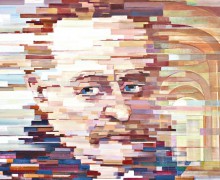Ukraine lately celebrated two major anniversaries, for the 92nd birth anniversary of pioneer of cybernetics and computer engineering Professor Viktor Glushkov was marked on August 24, while the 159th birth anniversary of prominent author, philosopher, public figure, and politician Ivan Franko was celebrated on August 27. Clearly, there was much more than just calendar dates to these events, though. Back in their time, both figures formulated ideas and meanings which have greatly impacted our worldview. The Day has tried to establish whether we realize what treasures we are heirs to, and whether we are able to actualize them under modern conditions.
Mykhailo SLABOSHPYTSKY, author,
literary critic, executive director of the League of Ukrainian Philanthropists:
“Show me some people in Ukraine (except Franko scholars) who can boast of having read the entire Franko corpus. We do not know Franko’s legacy in its entirety! Experts say that the Soviet-era 50-volume collected works were mutilated, ‘castrated.’ We definitely have at least 50 volumes more of texts that need to be published and fully comprehended.
“What we know today is mostly Franko the lyrical poet, author of The Eternal Revolutionary, It Thunders, Withered Leaves, and Stolen Happiness, but even our knowledge of that part of his legacy is still fragmented and lacking context. We do not know his seminal work What Is Progress? Even politicians, I believe, have never heard of it, despite it being his manifesto. Franko was not a doctor of philosophy for nothing! I remember how he impressed me when I was reading that work back in the Soviet time. ‘If one goes about building a state following party-building techniques,’ he wrote, ‘this new state, much-praised by Friedrich Engels, will turn into one full of new old injustices, extinguished in one way, but revived in another.’ Just think how far back it was said! It becomes clear, then, why Soviet ideologues put so much effort into concealing and censoring this work. Franko was a prophet of sorts, able to foresee next century’s issues and dangers brought by left-leaning forces.
“When turning to leftist, social democratic sympathies of young Franko, we mostly avoid thorough discussion of this topic, believing them to be a ‘childhood disease’ of the author. It is unpopular topic now. Such stance is wrong! Even Franko’s fiction, such as Boryslav Is Laughing and Crossed Paths, offers vivid descriptions of the threat posed to humanity by the capital. He understood why a person can be enslaved by the state and crushed by the capital. Without doubt, Franko’s vision of the future called for a Ukrainian nation state, but it was to be a free Ukrainian state of free Ukrainian people! He saw as dangerous not only the Engelsian state, but the oligarchic, semi-feudal state, which we have today, as well. I mean the denationalized state, the state with blatantly unfair distribution of national wealth. Franko’s call for implementing principles of social justice is the warning that we have not heard yet.
“Separately, we need to study Franko’s approaches to nation’s cultural development. This doctrine alone, as expressed in his fiction, articles on sociology and cultural history, journalistic and critical pieces, is comprehensive enough for a full-length intellectual biography to be written.
“Franko was a philosopher, an encyclopedic scholar, and a historian who paid special attention to history of religion. He was a true Renaissance person, a belated echo of the Renaissance in Ukraine. We have not been able to fully comprehend his importance yet. In this time of intellectual degradation of society and intellectual laziness, Franko is just too great and too complicated for us. Our university students have long been studying ersatz Franko. We are hopelessly behind him and falling further behind. Unfortunately, we now see him as a museum exhibit, a monument, a figure from distant history of Ukrainian literature. Our encounter with real Franko still lies in the future. This summit must reappear on the Ukrainian intellectual horizon. Then and only then will we be able to ‘report’ that, guided by his fundamental principles, we are building a true nation state of free people.”








